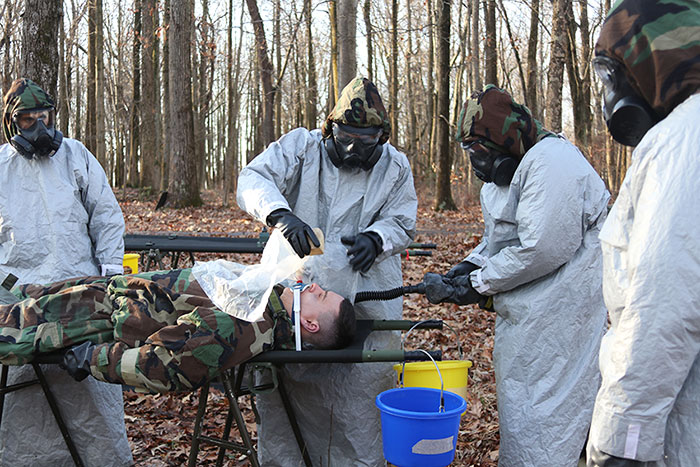USAMRICD Training Goes Online in Response to COVID-19

For many Army organizations with a dedicated training mission, the recent Department of Defense (DOD) travel restrictions implemented to prevent the spread of COVID-19 have presented unprecedented challenges. The U.S. Army Medical Research and Development Command's (USAMRDC) U.S. Army Medical Research Institute of Chemical Defense (USAMRICD), along with its sister laboratory, the U.S. Army Medical Research Institute of Infectious Diseases (USAMRIID), faced a dilemma when it came to the important training both entities jointly offer. The pandemic had already forced cancellation of their Medical Management of Chemical and Biological (MCBC) course (scheduled for May), and with restrictions likely to continue, any future on-site instruction would likely be cancelled as well. Yet many of the individuals who take the training–for example, physicians, nurses, emergency medical technicians and other medical personnel–do so to satisfy core requirements for graduation from residencies or to maintain qualifications to continue chemical surety missions at various installations across the Army. In a normal year, eight on-site offerings of the MCBC course occur.
So USAMRICD's Chemical Casualty Care Division (CCCD) and their counterparts at USAMRIID explored the alternative adopted by local schools and institutions of higher learning: offering the course online, and in real time.
Doing so, however, was a challenging endeavor; particularly because only a portion of the course consists of classroom lectures. How were USAMRICD and USAMRIID to cover all of the hands-on exercises and field training? Such training includes reviewing and practicing certain medical techniques, practicing how to don gas masks and MOPP (Mission-Oriented Protective Posture) gear, and running a decontamination site. For this portion of the on-site course, the MRICD has state-of-the-art facilities in its emergency-room-like simulation laboratory and Wide Angle Virtual Environment (WAVE) center, as well as its field-exercise (FTX) site.
The CCCD began by researching the best platform to use to conduct the course online. This included close coordination with USAMRIID to ensure they also had similar capabilities as well as identifying and troubleshooting the technical requirements for registered students, who would be participating from across the U.S.
"Beyond that," said Maj. Jessica Reeves, CCCD's chief of Training and Education, "we had to review and revamp our lectures to fit this online format."
"We also tried to minimize the impact of not being able to do the hands-on training of the Sim lab, WAVE, and FTX via demonstrations and a detailed review of the steps expected," continued Reeves. "We have multiple video demonstrations that teach and show how to use the gear, what the proper techniques are, and examples of different potential patient presentations."
All that remained at that point was to review the videos to ensure they would stream properly. The first iteration of the new online format took place from June 15 - 19 with 16 students taking the course for certification and nine auditing it; among the students seeking certification were eight physicians, a physician's assistant, four nurse practitioners, a nurse, and two trainers from the Defense Threat Reduction Agency. According to Reeves, the course went well and feedback from the students was mostly positive.
"The students were able to get a lot of information and be certified and were able to take care of their various missions," said Reeves.
Reeves noted, however, a few areas for improvement, including greater optimization of the videos so that they stream better and enhancing student interactions with the presenters.
Also offered several times a year by the USAMRICD are the Field Management of Chemical and Biological Casualties (FCBC) course for medics, paramedics, Medical Service and Chemical Corps officers, firemen, physician assistants, and other medical professionals. Further, the Hospital Management of Chemical, Biological, Radiological, Nuclear and Explosive (HM-CBRNE) Incidents course–which in addition to medical care providers is also for hospital management personnel, emergency planners, emergency responders, and public health officials–is also offered several times a year.
While Reeves says that CCCD is looking into offering online versions of these two courses, especially if current restrictions regarding COVID-19 continue, the challenge of doing so is even greater.
"Those courses are even more field-exercise heavy," said Reeves. "We are currently looking into ways to mitigate this issue."
 An official website of the United States government
An official website of the United States government
 ) or https:// means you've safely connected to the .mil website. Share sensitive information only on official, secure websites.
) or https:// means you've safely connected to the .mil website. Share sensitive information only on official, secure websites.


